Andrew Cartmel's Blog, page 33
January 18, 2015
Gone Girl by Gillian Flynn
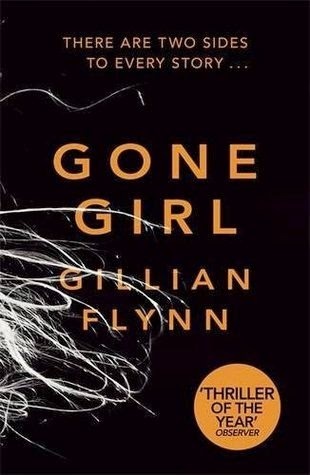 It's difficult to express the depth of my admiration for Gone Girl. I've already written about the film. Now it's time to concentrate on where it all started, the novel by Gillian Flynn. ("Gillian" is pronounced with a hard "G" — I just thought you should know.)
It's difficult to express the depth of my admiration for Gone Girl. I've already written about the film. Now it's time to concentrate on where it all started, the novel by Gillian Flynn. ("Gillian" is pronounced with a hard "G" — I just thought you should know.)This novel is dark — it explores some very twisted realms of psychology, like a magnificent modern take on a classic James M. Cain noir (think of the end of Double Indemnity — the book I mean, not the movie; they're radically different).
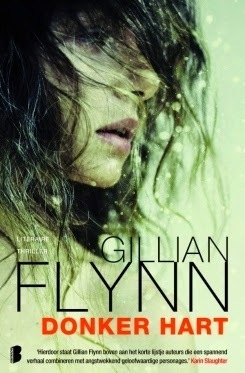 Gone Girl is a fantastically engrossing book. Even more than James Cain, it reminds me of John D. MacDonald, like a vintage Travis McGee tale where the hero begins to unravel the chilling background of the implacable psychopath — the cumulative creation of a most memorable monster.
Gone Girl is a fantastically engrossing book. Even more than James Cain, it reminds me of John D. MacDonald, like a vintage Travis McGee tale where the hero begins to unravel the chilling background of the implacable psychopath — the cumulative creation of a most memorable monster.Quite apart from being superbly plotted, it is also beautifully written. It's full of sharp observation: "Sleep is like a cat: It only comes if you ignore it." And vivid evocation: "The canned heat of a closed house in July shimmered over me." Or: "A jet shot over the house, that awful sky-rip noise."
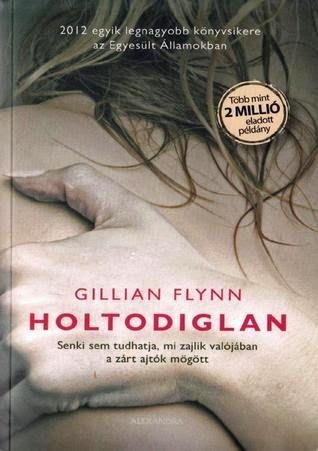 And then there's the way Flynn nails people. Like the white trash couple who are "meth-weathered." And the bawdy girl who is brought to life thus: "She laughed a pirate-wench laugh." Or consider this unfortunate: "She already has the righteous, eye rolling cadence of a conspiracy crackpot. She might as well wrap her head in foil." (As you can see, Flynn is also often very funny.)
And then there's the way Flynn nails people. Like the white trash couple who are "meth-weathered." And the bawdy girl who is brought to life thus: "She laughed a pirate-wench laugh." Or consider this unfortunate: "She already has the righteous, eye rolling cadence of a conspiracy crackpot. She might as well wrap her head in foil." (As you can see, Flynn is also often very funny.)As you may know, the book is as much about media scrutiny — the feeding frenzy of the press — as it is about a murder. And this brings out some of Flynn's finest moments. Here she is describing what it feels like to be under siege by the press: "The seagull cries of a few female news anchors" ... "Once the shades were pulled, it was like covering a canary for the night. The noise out front stopped."
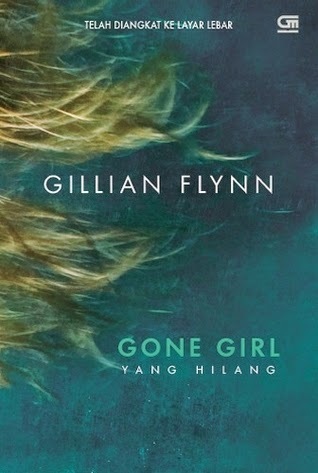 Not since the masterworks of Thomas Harris have I come across a novel which is both so brilliantly conceived and beautifully written. "I could feel my brain expand and deflate simultaneously — my own cerebral Hitchcock zoom." (Gillian Flynn is here referring to a dolly zoom — those unforgettable moments when they zoom in and pull back the camera simultaneously. You know exactly what she means.)
Not since the masterworks of Thomas Harris have I come across a novel which is both so brilliantly conceived and beautifully written. "I could feel my brain expand and deflate simultaneously — my own cerebral Hitchcock zoom." (Gillian Flynn is here referring to a dolly zoom — those unforgettable moments when they zoom in and pull back the camera simultaneously. You know exactly what she means.)And it is a very acute piece of writing psychologically — "now that she was gone I could enjoy the idea of her." Particularly on the subject of marriage, where the book throws up some deeply unsettling observations: "Our kind of love can go into remission."
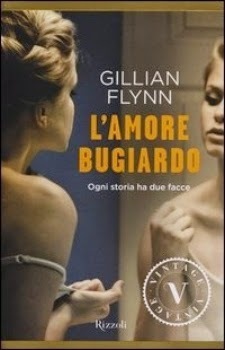 It's amazing the grip Gone Girl has on the reader. I was furious, outraged, sick with dread, even though I knew what was going to happen (as a result of seeing the movie). It's almost unbearable to read as Nick gets in deeper and deeper...
It's amazing the grip Gone Girl has on the reader. I was furious, outraged, sick with dread, even though I knew what was going to happen (as a result of seeing the movie). It's almost unbearable to read as Nick gets in deeper and deeper... Now having both seen the movie and read the book I am tremendously impressed at how they adapted it into a film. Because although all the essentials are the same, there are also huge differences. If you want a masterclass in turning a novel into a motion picture, then study this. (On the other hand, if you want to see how to turn a novel into a TV show, check out The Slap.)
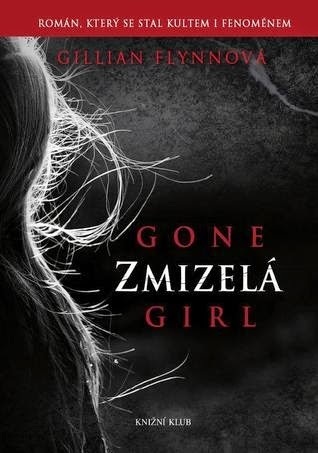 It's positively breathtaking, what Gillian Flynn and David Fincher have achieved; the diligence with which they boiled down, re-structured and re-emphasised the book is deeply impressive. They have also set about a ruthless winnowing of the book's secondary characters.
It's positively breathtaking, what Gillian Flynn and David Fincher have achieved; the diligence with which they boiled down, re-structured and re-emphasised the book is deeply impressive. They have also set about a ruthless winnowing of the book's secondary characters.My single complaint (I have to have one): Abbreviating a character's name from the proper noun "Margo" to the presumed verb "Go" is as confusing on the page as it was on the screen. Budding authors beware.
(Image credits: All these covers are from Good Reads, including the Czech edition. I love the Czechs — they've just bought my novel.)
Published on January 18, 2015 02:00
January 11, 2015
Spartacus by Steven DeKnight
 One of my favourite television dramas of recent years was Rome, the brainchild of Bruno Heller, the talented writer who went on to create The Mentalist. Heller had to go on to create the Mentalist because, sadly, Rome only lasted two series. This was due to shortsighted executives at the BBC who cancelled it when their bean-counters calculated that the show wasn't successful enough to justify its budget.
One of my favourite television dramas of recent years was Rome, the brainchild of Bruno Heller, the talented writer who went on to create The Mentalist. Heller had to go on to create the Mentalist because, sadly, Rome only lasted two series. This was due to shortsighted executives at the BBC who cancelled it when their bean-counters calculated that the show wasn't successful enough to justify its budget. So they axed Rome, just as DVD sales were going through the roof. And they discovered, to their horror, that they'd killed off a hit show. (In an interview Charles Dance — star of both Rome and Game of Thrones — was asked if the BBC could have produced with Game of Thrones. "They would have cancelled it after two series," he said.)
 But the spirit of Rome lives on, most unexpectedly, in Spartacus: Blood and Sand. This American/Antipodean co-production comes on like a Mickey Spillane rewrite of Rome. It's pulp fiction — crude, energetic, lurid and wonderfully prurient. Full of sex, nudity and bone-crunching, blood-spattering violence, subtle it ain't.
But the spirit of Rome lives on, most unexpectedly, in Spartacus: Blood and Sand. This American/Antipodean co-production comes on like a Mickey Spillane rewrite of Rome. It's pulp fiction — crude, energetic, lurid and wonderfully prurient. Full of sex, nudity and bone-crunching, blood-spattering violence, subtle it ain't.Originally I started watching it as a guilty pleasure, not taking it very seriously. But as I worked my way through the first series I was startled to discover that it is a superbly constructed, beautifully written show. Vivid characterisation and deft manipulation of simple, powerful situations make for entirely gripping and addictive viewing.
 And although it's a low-brow, exploitation drama compared to Rome, it is also in some ways more profound and serious. Spartacus is a story inherently slanted from the slaves' point of view and, as such, it manages to powerfully convey the evil of Roman society and institutions in a way its more sophisticated predecessor never achieved. As an indictment of the institution of slavery, it easily eclipses 12 Years a Slave.
And although it's a low-brow, exploitation drama compared to Rome, it is also in some ways more profound and serious. Spartacus is a story inherently slanted from the slaves' point of view and, as such, it manages to powerfully convey the evil of Roman society and institutions in a way its more sophisticated predecessor never achieved. As an indictment of the institution of slavery, it easily eclipses 12 Years a Slave.The (tragically) late Andy Whitfield plays Spartacus, leading a strong cast which includes John Hannah and Lucy Lawless as the lascivious, conniving and lavishly immoral couple who run the gladiator academy where our hero is imprisoned. Lawless is a revelation — uninhibited and often terrifying in an all-stops-out performance. It's hard to believe she was once that nice Xena the Warrior Princess girl.
 Spartacus is, in many ways, the spawn of Xena — starring Lawless, produced by Sam Raimi and featuring music by Joseph LoDuca, all from that series. But really Spartacus is the spawn of Steven DeKnight, the American writer and veteran of Buffy the Vampire Slayer, Angel and Smallville, who created this terrific series. And we should also take note of Daniel Knauf, who created the intriguing series Carnivàle, and wrote some outstanding episodes of Spartacus.
Spartacus is, in many ways, the spawn of Xena — starring Lawless, produced by Sam Raimi and featuring music by Joseph LoDuca, all from that series. But really Spartacus is the spawn of Steven DeKnight, the American writer and veteran of Buffy the Vampire Slayer, Angel and Smallville, who created this terrific series. And we should also take note of Daniel Knauf, who created the intriguing series Carnivàle, and wrote some outstanding episodes of Spartacus.I need to leaven my praise just a little, though. If Spartacus has an Achilles heel (excuse me mixing Roman and Greek mythology), it's the dialogue. In their attempts to invent stuff that sounds suitably ancient, the writers occasionally come up with gibberish.
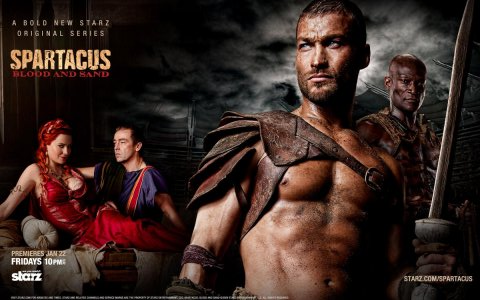 Their verbal contortions turn nonsensical, and sometimes end up reversing the very meaning of a sentence — "He never ceases to tire of the games" is my current favourite. This sort of tosh would never have been permitted in Bruno Heller's Rome.
Their verbal contortions turn nonsensical, and sometimes end up reversing the very meaning of a sentence — "He never ceases to tire of the games" is my current favourite. This sort of tosh would never have been permitted in Bruno Heller's Rome.But that's a small point. Here's the big picture... Spartacus is a heady mix. Stunning, transgressive and beautifully done. It's magnificently constructed, a model of television screenwriting. Minimal, powerful, extremely dramatic and a masterpiece of clarity — all the characters' motivations are strong and clear, and everything makes sense. It shows what a great chef (Steven DeKnight — and his writing team) can do with simple ingredients. It's a classic.
(Image credits: All the posters are from Movie Poster DB.)
Published on January 11, 2015 02:02
January 4, 2015
Best Films of 2014
 I am going to nominate 14 movies as the best of 2014 (I realise this tendency can't continue year after year, or we'll end up with very lengthy lists. But I just couldn't cut it down to 12 or even 13, like last year.)
I am going to nominate 14 movies as the best of 2014 (I realise this tendency can't continue year after year, or we'll end up with very lengthy lists. But I just couldn't cut it down to 12 or even 13, like last year.) First, the movies that almost made the cut... I was a little reluctant to lose Starred Up, but there was another Jack O'Connell vehicle in the list, and it has the edge. (Just.) And David Ayer's Sabotage deserves recognition for its furious, ruthless darkness of tone and uncompromising blood-thirstiness. But there's another Ayer film, very near the top of this year's honours...
 Then The Purge: Anarchy missed out because there is an even better low budget American thriller high on my list. Guardians of the Galaxy was sheer oddball pleasure and in a weaker field would have received recognition. And mention must be made of Peter Jackson's last two Hobbit movies (Smaug and, especially, Five Armies)...
Then The Purge: Anarchy missed out because there is an even better low budget American thriller high on my list. Guardians of the Galaxy was sheer oddball pleasure and in a weaker field would have received recognition. And mention must be made of Peter Jackson's last two Hobbit movies (Smaug and, especially, Five Armies)...Okay, so on to the list proper. We will begin at the bottom of the ladder and work our way to the top spot. Let's start with a really unlikely nomination at number 14. Robocop. Yes, I loved the original, but this remake has virtues all its own. Veronica Mars had to be included due to my sheer love of the TV show. It also helped that Rob Thomas and Diane Ruggerio did a great job. I seem to be alone in recognising the brilliance of Aronofsky's Noah, but brilliant it is.
 '71 by Burke and Demange was the other Jack O'Connell picture which, despite some flaws, demands recognition. Then comes a real surprise, The Judge was a family drama and courtroom thriller with a strong line of comedy, beautifully played by Robert Downey and Robert Duvall. It vanished without a trace, but I loved it despite a weak ending. Co-written by Nick Schenk, who also worked on Gran Torino.
'71 by Burke and Demange was the other Jack O'Connell picture which, despite some flaws, demands recognition. Then comes a real surprise, The Judge was a family drama and courtroom thriller with a strong line of comedy, beautifully played by Robert Downey and Robert Duvall. It vanished without a trace, but I loved it despite a weak ending. Co-written by Nick Schenk, who also worked on Gran Torino.Then we have Charlie Countryman, a beautiful, touching, oddball little movie which also happens to be a great comedy and a gripping thriller with an outstanding cast. And David Cronenberg (who had bored me beyond belief with Cosmopolis) surprised and gratified me with a terrific left-field entry, the savage Hollywood satire Maps to the Stars written by Bruce Wagner.
 Now we come to my real favourites. Edge of Tomorrow. Who would have thought a Tom Cruise SF shoot-em-up could be so wonderful? And then the James Brown biopic Get On Up which had a script by the Butterworth brothers, who also worked on Edge of Tomorrow.
Now we come to my real favourites. Edge of Tomorrow. Who would have thought a Tom Cruise SF shoot-em-up could be so wonderful? And then the James Brown biopic Get On Up which had a script by the Butterworth brothers, who also worked on Edge of Tomorrow.From this point on, we are looking at strong candidates for the number one spot. Hovering just under that top honour are David Fincher and Gillian Flynn's Gone Girl (based on Flynn's novel); the dark and delightful nightmare-thriller The Guest by Barrett and Wingard (which eclipsed The Purge: Anarchy) and David Ayer's hellishly majestic war movie Fury, which knocked his Sabotage into the long grass. I'd put all this trio together in a very honourable third place — but if I had to chose my favourite among them, it would be Gone Girl.
 In at number 2, and closely contending for the very top honour, is a real dark horse, a low budget one-man movie called Locke, starring the superb Tom Hardy and written and directed by Steven Knight.
In at number 2, and closely contending for the very top honour, is a real dark horse, a low budget one-man movie called Locke, starring the superb Tom Hardy and written and directed by Steven Knight.But the best film of 2014, by a country mile, was Wolf of Wall Street. A magnificent return to form by Scorsese this movie, written by Terence Winter (who also created Boardwalk Empire) was unhinged, sulphurous, brilliant, hilarious and sexy. Just writing about it makes me want to see it again.
(Image credits: the posters are from Ace Show Biz, except The Guest, which is from The Consulting Detective.)
Published on January 04, 2015 02:00
December 28, 2014
Straight Cut by Madison Smartt Bell
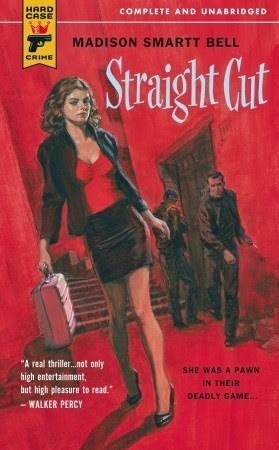 I'd never heard of Madison Smartt Bell, but two things drew me to this novel. Firstly, it was published by Charles Aradai's Hard Case Crime. As I've discussed before, this has long been one of my favourite publishers. Recently I have been even more favourably disposed towards this imprint because my brilliant editor Miranda Jewess at Titan Books is also the UK editor of Hard Case Crime.
I'd never heard of Madison Smartt Bell, but two things drew me to this novel. Firstly, it was published by Charles Aradai's Hard Case Crime. As I've discussed before, this has long been one of my favourite publishers. Recently I have been even more favourably disposed towards this imprint because my brilliant editor Miranda Jewess at Titan Books is also the UK editor of Hard Case Crime.The second factor which compelled me to read Straight Cut was a quote on the cover by Walker Percy, a novelist I admire hugely. So I promptly obtained a copy of Bell's book, and I'm very pleased that I did.
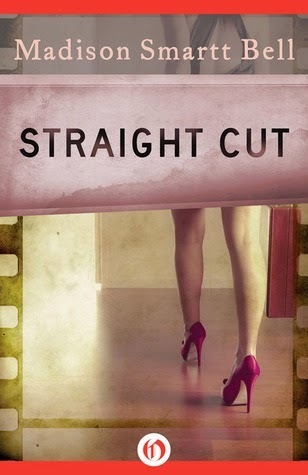 Straight Cut begins with an affecting and involving sequence in which the hero Tracy Bateman has to kill his (terminally ill) dog on his farm near Nashville — like Walker Percy, the author is a southerner.
Straight Cut begins with an affecting and involving sequence in which the hero Tracy Bateman has to kill his (terminally ill) dog on his farm near Nashville — like Walker Percy, the author is a southerner. This touching, disturbing scene establishes the character of Tracy and sets the dark tone for what is to follow. When he is summoned to New York, it turns out that Tracy is a film editor — the details of his work are superbly described and are one of the great strengths of the book.
Tracy's business partner in film making is a distinctly dubious character who has ensnared him more than once before in some very dodgy — and dangerous — drug deals and when it looks like this might be happening again and, what's more, involving Tracy's ex-wife (whom he still loves) the plot is up and running.
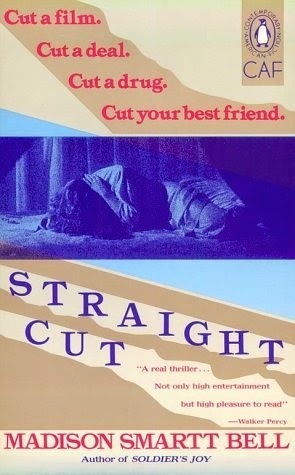 The characters and situation exert considerable attraction, but what is really notable about the book is the quality of the writing. Here is an assessment of Kevin, the dodgy partner: "this innocence of his was simply a vacancy, a vacuum. And the winds which whirled around it could do all sorts of damage to anyone in the near vicinity."
The characters and situation exert considerable attraction, but what is really notable about the book is the quality of the writing. Here is an assessment of Kevin, the dodgy partner: "this innocence of his was simply a vacancy, a vacuum. And the winds which whirled around it could do all sorts of damage to anyone in the near vicinity."When Tracy flies to Rome he tells us, "the stewards pulled up all the blinds and startled the drowsy passengers with the sudden light of Italian morning... with the Rome airport floating up under the wings." And here is the description of a deeply stoned Roman junkie, a girl with a "bright empty" smile: "The smile ended abruptly, like a light bulb burning out." Elsewhere we have the forger whose "hands made spidery shadows under the high intensity lamp."
Moving back and forth across Europe and the USA in the 1980s, Straight Cut it is a little far-fetched at times, with some deeply convenient happenstance (the hero's old friend turns out to be an expert sniper), and a silly sequence involving a block and tackle, but that doesn't seriously affect the novel.
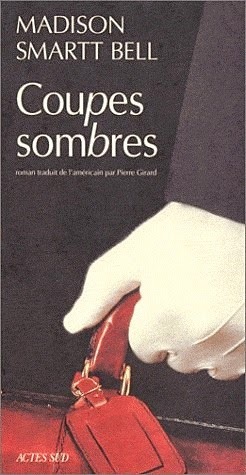 Bell's novel reminds me of Robert Stone's Dog Soldiers, though I think it is even better. Straight Cut is an intelligent, sardonic, beautifully written, engrossing thriller and I commend it to you.
Bell's novel reminds me of Robert Stone's Dog Soldiers, though I think it is even better. Straight Cut is an intelligent, sardonic, beautifully written, engrossing thriller and I commend it to you. Meanwhile, I am going to start a serious campaign of exploring Madison Smartt Bell's other novels. And I'm pleased to say there's quite a few of them...
(Image credits: All the covers are from Good Reads.)
Published on December 28, 2014 02:00
December 21, 2014
The Girl by Samantha Geimer
 Roman Polanksi is a film maker of genius, and I've always had the highest regard for his work. But obviously there is a shadow across his life and career, and anyone who is a Polanski advocate — or even an admirer — has to somehow deal with the fact that he was guilty of unlawful sexual intercourse with a 13 year old girl, after plying her with the fashionable drugs of the day.
Roman Polanksi is a film maker of genius, and I've always had the highest regard for his work. But obviously there is a shadow across his life and career, and anyone who is a Polanski advocate — or even an admirer — has to somehow deal with the fact that he was guilty of unlawful sexual intercourse with a 13 year old girl, after plying her with the fashionable drugs of the day.There's no shortage of books on Polanski. Along with Stanley Kubrick he is probably the most written-about film director in history. But arguably the best account of those troubling events has remained Polanski's autobiography. Until now... when Samantha Geimer — "the girl" in the case — has finally published her own autobiography.
 The Girl, by Geimer and Judith Newman, is a well written and gripping book. Its disturbing, touching and often — surprise — darkly funny. What comes across most strongly, as in almost all the other versions of the story (and particularly forcefully in Marina Zenovich's excellent documentary film on the subject) is that, as reprehensible as Polanski's behaviour unquestionably is, the real villain of the piece is the judge who tried the case. The dishonourable Laurence J. Rittenband was a sleazy fame-seeking publicity hound who threw justice in the nearest trash receptacle so he could promote his own image.
The Girl, by Geimer and Judith Newman, is a well written and gripping book. Its disturbing, touching and often — surprise — darkly funny. What comes across most strongly, as in almost all the other versions of the story (and particularly forcefully in Marina Zenovich's excellent documentary film on the subject) is that, as reprehensible as Polanski's behaviour unquestionably is, the real villain of the piece is the judge who tried the case. The dishonourable Laurence J. Rittenband was a sleazy fame-seeking publicity hound who threw justice in the nearest trash receptacle so he could promote his own image.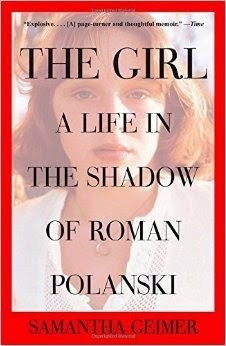 Geimer's story is full of unforgettable moments. And the most compelling thing is that however awful her experience with Polanksi, it was nothing compared to the legal process which then swallowed her life. She says, "If I had to chose between reliving the rape or the grand jury testimony, I would chose the rape."
Geimer's story is full of unforgettable moments. And the most compelling thing is that however awful her experience with Polanksi, it was nothing compared to the legal process which then swallowed her life. She says, "If I had to chose between reliving the rape or the grand jury testimony, I would chose the rape."And then there's the striking description of how she felt when the other kids at her school found out that she was the girl in the case: "You know that recurring dream we all have where we forget to put on our clothes, and go out in public naked? This felt like walking around school naked."
 Or her remarks about attending the glittering bash for the HBO premiere of Zenovich's documentary, decades later. "I was uncomfortable... the thought that I was at this party with all those celebrities and other luminaries simply because I'd been raped by some old goat seemed kind of mortifying."
Or her remarks about attending the glittering bash for the HBO premiere of Zenovich's documentary, decades later. "I was uncomfortable... the thought that I was at this party with all those celebrities and other luminaries simply because I'd been raped by some old goat seemed kind of mortifying."And, most startling of all, her reaction when Polanski won the Oscar for The Pianist. "I was quietly thrilled for his victory."
In the end, the portrait of Polanski at the time of the assault which emerges is one of a callous, arrogant and selfish man. It's quite possible to be a great film maker, and that too. Geimer's own summary of his motivation: "Roman Polanski was a man who was horny and high on March 10, 1977. That's it."
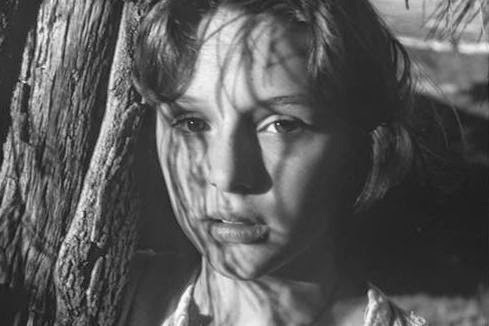 Perhaps the only unjust note in this otherwise remarkably fair and even-handed book is when Geimer denigrates the quality of the pictures that Polanksi took of her (they were supposed to be doing a fashion shoot when "the incident" occurred). It's apparently not enough that he's a rapist. He has to be a bad photographer, too. Actually the quality of the images speak for themselves. Some are reprinted in the book, and a particularly striking one is used on the cover.
Perhaps the only unjust note in this otherwise remarkably fair and even-handed book is when Geimer denigrates the quality of the pictures that Polanksi took of her (they were supposed to be doing a fashion shoot when "the incident" occurred). It's apparently not enough that he's a rapist. He has to be a bad photographer, too. Actually the quality of the images speak for themselves. Some are reprinted in the book, and a particularly striking one is used on the cover.(Image credits: the cover of the book is from the Hollywood Reporter. The black and white photo of Polanski is from the New York Times. The black and white photo by Polanski is from Stern. The colour photo is from the Daily Mail. The reprint edition of the book, with type over the image, is from Amazon.)
Published on December 21, 2014 02:00
December 14, 2014
Gone Girl by Flynn and Fincher
 The time is coming to suss out the best films of the year, and it looks like Gone Girl may well be gunning for the top slot. It is tremendously gratifying to have David Fincher continue a run of great movies. After the masterpiece that was Fight Club there was a period (Panic Room, Zodiac, Benjamin Button) where the director seemed to have lost his way. But he came roaring back with The Social Network, followed it with the magnificent American version of The Girl With the Dragon Tattoo, and now we have Gone Girl.
The time is coming to suss out the best films of the year, and it looks like Gone Girl may well be gunning for the top slot. It is tremendously gratifying to have David Fincher continue a run of great movies. After the masterpiece that was Fight Club there was a period (Panic Room, Zodiac, Benjamin Button) where the director seemed to have lost his way. But he came roaring back with The Social Network, followed it with the magnificent American version of The Girl With the Dragon Tattoo, and now we have Gone Girl.David Fincher brings to mind Stanley Kubrick in the extraordinary beauty and perfection of his filming. Yet his movies have a more organic feel; they're more human and warmer — although that's an odd word to use, considering the darkness and chilliness of his material. Maybe I simply mean they have more passion and emotion.
 Fincher also seems to have more respect for his screenwriters. He chooses them with care and collaborates with them as equals. In the case of Gone Girl this has paid tremendous dividends.
Fincher also seems to have more respect for his screenwriters. He chooses them with care and collaborates with them as equals. In the case of Gone Girl this has paid tremendous dividends.Gone Girl is based on a bestselling blockbuster of a novel by Gillian Flynn ('Gillian' is pronounced with a hard 'G'). When Flynn sold the novel to the movies — for a healthy fee, I trust — part of the deal was she'd get first chance at writing the script. Then David Fincher came on board and the suits effectively said to him, "Don't worry about the girl novelist. We'll bin her attempt and hire any screenwriter you want." (I'm inventing dialogue here!) But Fincher said to wait and see what she came up with...
 And Gillian Flynn has knocked it out of the ball park, as has David Fincher. Gone Girl is a superb, shocking, dark, brutal and beautifully constructed thriller. A genuine classic. And if you haven't read the book you are in for some fun surprises.
And Gillian Flynn has knocked it out of the ball park, as has David Fincher. Gone Girl is a superb, shocking, dark, brutal and beautifully constructed thriller. A genuine classic. And if you haven't read the book you are in for some fun surprises.Plaudits are due to an exemplary cast led by Ben Affleck, with Neil Patrick Harris in a great screwball role, Carrie Coone wonderful as Affleck's sister, Tyler Perry jovial and sleazy as a hotshot defence lawyer and Missi Pyle memorably reprising a bit she did as an annoyingly hustling TV host in The Mentalist. Also outstanding are Lola Kirke and Boyd Holbrook as a canny white trash couple.
 The movie additionally features a fine performance by a ginger cat called Boris. (While researching Boris online I discovered a mini-version of the movie performed entirely by cats. Yes, I did. Really. Here it is.)
The movie additionally features a fine performance by a ginger cat called Boris. (While researching Boris online I discovered a mini-version of the movie performed entirely by cats. Yes, I did. Really. Here it is.)Also on board are Fincher's A-team of Trent Reznor and Atticus Ross on music and cinematographer Jeff Cronenweth.
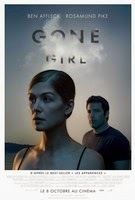 I only have one criticism of the film... Affleck's sister is called Margo, which is shortened to the nickname "Go."
I only have one criticism of the film... Affleck's sister is called Margo, which is shortened to the nickname "Go." Every time her name cropped up in dialogue I thought someone was being told to "go" somewhere and was momentarily baffled. The use of names in dialogue — especially odd names — is a potential minefield as far as audience confusions is concerned. Budding screenwriters make a note of that!
In the meantime, go and see Gone Girl.
(Image credits: All from Ace Show Biz.)
Published on December 14, 2014 02:00
December 7, 2014
Get On Up by the Butterworths
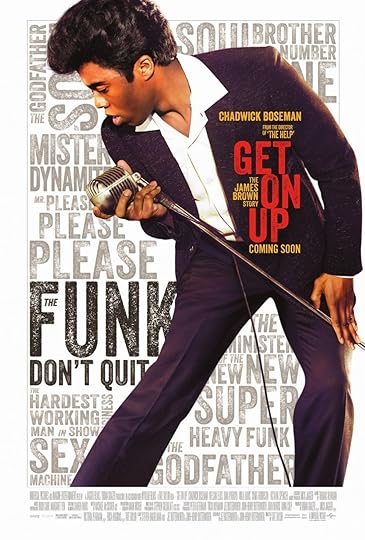 You should race out and see the James Brown biopic Get On Up. It is certainly one of the finest films of the year, and it only falls short of being an all time classic because it is beset by what I think of as Barry Lyndon syndrome — it tells the story of an engaging hero's rise to success, and then proceeds to chart his decline and fall... In rather too much detail.
You should race out and see the James Brown biopic Get On Up. It is certainly one of the finest films of the year, and it only falls short of being an all time classic because it is beset by what I think of as Barry Lyndon syndrome — it tells the story of an engaging hero's rise to success, and then proceeds to chart his decline and fall... In rather too much detail. Lingering on the negative stuff is always a danger in such stories — no one wants to whitewash the negative side of real life characters, or deny true tragedy. And this movie is a blast of sunshine compared to the recent Ian Dury biopic, which was an unremitting plateau of grimness.
 But still, the length of Get On Up (138 minutes) and the emphasis on some of the bleaker aspects of its complex hero run the risk of making it ultimately a bit of downer for the audience. And we're in danger of leaving the cinema feeling depressed instead of uplifted.
But still, the length of Get On Up (138 minutes) and the emphasis on some of the bleaker aspects of its complex hero run the risk of making it ultimately a bit of downer for the audience. And we're in danger of leaving the cinema feeling depressed instead of uplifted.This is despite the strikingly imaginative and often brilliant efforts of its screenwriting team, the brothers Jez Butterworth and John-Henry Butterworh (working from an early draft of the script by Steven Baigelman). The Butterworths also recently made a superb contribution to Edge of Tomorrow. Their hilarious, incisive script — often verging on the surreal — cannily choses key moments from James Brown's life and juxtaposes them with no regard for chronology. We also have the hero directly addressing the audience (breaking the fourth wall, we call it) like Michael Caine did in Alfie.

It's a great approach, creating a genuine work of art, and they may well be great screenwriters. They've also done their research, and not just about the music. Check out Mr Brown's hilarious critique of the US Army's strategy in Vietnam.
Homage must also be paid to the extraordinary performances by Chadwick Boseman as James Brown and Nelsan Ellis as his righthand man, Bobby Byrd. These guys deserve the best actor and best supporting actor Oscars this year, without question. Whether they'll get them is another matter, of course. Mention should also be made of Brandon Smith, who is a scream (appropriately enough) as Little Richard.
 The music in the film is also, predictably, superb. Rush out and see this movie before it's gone. It's already vanishing from cinema screens like the snow in springtime, which is a tragedy.
The music in the film is also, predictably, superb. Rush out and see this movie before it's gone. It's already vanishing from cinema screens like the snow in springtime, which is a tragedy.(Image credits: Ace Show Biz.)
Published on December 07, 2014 02:00
November 30, 2014
The Homesman by Tommy Lee Jones
 The Homesman is a novel by Glendon Swarthout, a fascinating and prolific American writer who also wrote The Shootist, another western which was adapted into a Don Siegel film starring John Wayne (and a recent BBC Radio 4 drama by Nick Perry). Now The Homesman has been made into a film by Tommy Lee Jones, who has directed it, stars in it and co-wrote the screenplay with Kieran Fitzgerald and Wesley A. Oliver.
The Homesman is a novel by Glendon Swarthout, a fascinating and prolific American writer who also wrote The Shootist, another western which was adapted into a Don Siegel film starring John Wayne (and a recent BBC Radio 4 drama by Nick Perry). Now The Homesman has been made into a film by Tommy Lee Jones, who has directed it, stars in it and co-wrote the screenplay with Kieran Fitzgerald and Wesley A. Oliver.  The title refers to a homesteader or pioneer dirt farmer in the bleak frontier of the 19th century. The film tells the story of a spinster Mary Bee Cuddy (played by Hilary Swank) who ends up taking three broken women back east because they can't endure life on the prairie. The women have all gone insane. In fact, the life of the settlers as depicted is so bleak it's a wonder that anyone hasn't gone insane out there.
The title refers to a homesteader or pioneer dirt farmer in the bleak frontier of the 19th century. The film tells the story of a spinster Mary Bee Cuddy (played by Hilary Swank) who ends up taking three broken women back east because they can't endure life on the prairie. The women have all gone insane. In fact, the life of the settlers as depicted is so bleak it's a wonder that anyone hasn't gone insane out there. Transporting three mad women across the wilderness on a odyssey that will last months is a hellish task, and Cuddy is lucky enough to enlist the help of a lovable rogue called George Briggs (Tommy Lee Jones). As they spar and argue and surmount hardships together, the roughneck and the old maid, we seem to be in for a classic budding romance and comedy adventure in the mould of The African Queen.
Transporting three mad women across the wilderness on a odyssey that will last months is a hellish task, and Cuddy is lucky enough to enlist the help of a lovable rogue called George Briggs (Tommy Lee Jones). As they spar and argue and surmount hardships together, the roughneck and the old maid, we seem to be in for a classic budding romance and comedy adventure in the mould of The African Queen.Boy, does this movie not go there. It develops in a completely unforeseen way — it's harrowing, bleak and profoundly shocking. In fact it ends with a dark, existential flourish worthy of Monte Hellman or John Huston at his most grim and anti-commercial (Fat City, say).
 The ad campaign for The Homesman trumpets that it's the best western since Unforgiven. Maybe so. But that's a misleading comparison. For all its revisionist brilliance, David Peoples' script for Unforgiven followed the conventional contours of the western action movie. The Homesman is anything but that.
The ad campaign for The Homesman trumpets that it's the best western since Unforgiven. Maybe so. But that's a misleading comparison. For all its revisionist brilliance, David Peoples' script for Unforgiven followed the conventional contours of the western action movie. The Homesman is anything but that.Well worth seeing, though.
(Image credits: The poster with the two faces close together is from Wikipedia. The rest are from Ace Show Biz as usual.)
Published on November 30, 2014 02:08
November 23, 2014
Fury by David Ayer
 David Ayer is a writer and director who is responsible for an outstanding string of cop films, including a couple of collaborations with James Ellroy (Dark Blue and Street Kings) as well as Harsh Times, Training Day and two recent superb examples, End of Watch and Sabotage.
David Ayer is a writer and director who is responsible for an outstanding string of cop films, including a couple of collaborations with James Ellroy (Dark Blue and Street Kings) as well as Harsh Times, Training Day and two recent superb examples, End of Watch and Sabotage. Now he has delivered a superlative war movie. Indeed, Fury is the finest war picture since Sam Peckinpah's Cross of Iron.
Brad Pitt as the tank commander War Daddy has never been better in this tale of the final days of World War 2, as Germany crumbles and the Nazis fight a vicious last ditch defence of the Fatherland. Unfortunately for War Daddy and his crew, the German Tiger tanks still make the American Shermans look like badly made tin toys.

War Daddy is a charismatic figure with his groovy leather jacket and boots and pin-up girls on the grips of his service revolver, which he wears in a fashionable shoulder holster. The story of Fury begins with War Daddy's assistant gunner dead in his tank (the eponymous 'Fury') and follows the arbitrary recruitment of an untrained clerk Norman (sensitively played by Logan Lerman) to take the dead man's place in the hot seat.
The rest of the tank team consists of Ayer regular Michael Peña as Gordo ('Fatso' in Spanish), Shia LaBeouf as Bible and the memorably grungy Jon Bernthal as Coon-Ass. They are a crack team, and it's a cracking cast.

What follows is a stunning depiction of the brutal combat as the US Army rolls towards Berlin. Ayer has done his research and the script is first rate. He also does a breathtakingly good job of directing. He's particularly good at inserting moments of stillness and repose between the apocalyptic battle scenes.
There is a stunning set piece in which, after bloodily taking a German town, War Daddy drags Norman into a flat where two frightened young German women (Alicia von Rittberg and Anamaria Marinca) are living. There then ensues a remarkable film-within-a-film which explores an impressive range of emotions before the American troops roll out again to — as War Daddy says — take the next town. And the next.

Ayer's supported in fashioning this masterpiece by a formidable team of artists. His cinematographer is Roman Vasyanov who made such ravishing use of colour in Charlie Countryman (which also starred Shia LaBeouf). Here he has restricted himself to a much more grim and monochromatic palette — grey steel, brown mud, khaki uniforms — but his polychromatic genius blazes into life for an unforgettable nighttime battle sequence.
Steven Price who composed a masterful score for Gravity provides the music here, which features brooding vocals from a chorus and appears to incorporate the ringing sound of spent cartridge cases spilling onto the metal floor of the tank during a desperate battle.

A dark, bloody, violent film full of carnage. And also a classic. If you don't think you'll find it too upsetting, you must see it. I've seen it three times and now, writing about it, I find myself wanting to see it again.
And, whatever you do, don't miss the marvellous end credits. The brilliant, graphically-striking use of newsreel footage once again calls to mind Peckinpah's Cross of Iron, which had a similarly splendid title sequence.
 With the savage, bloody and memorable Sabotage (which was reminiscent of Bring Me the Head of Alfredo Garcia), David Ayer seemed to be aspiring to the crown of Sam Peckinpah.
With the savage, bloody and memorable Sabotage (which was reminiscent of Bring Me the Head of Alfredo Garcia), David Ayer seemed to be aspiring to the crown of Sam Peckinpah. With Fury he is beginning to seem worthy of it.
(Image credits: Ace Show Biz.)
Published on November 23, 2014 03:48
November 16, 2014
Horns by Keith Bunin
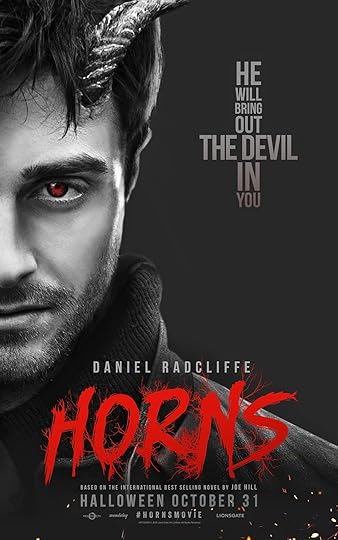 This film is strangely similar to The Necessary Death of Charlie Countryman, which I wrote about last week. Both movies are love stories combined with thrillers, and have a supernatural aspect. But whereas in Charlie Countryman the supernatural was a dispensable add-on, here in Horns it is absolutely central.
This film is strangely similar to The Necessary Death of Charlie Countryman, which I wrote about last week. Both movies are love stories combined with thrillers, and have a supernatural aspect. But whereas in Charlie Countryman the supernatural was a dispensable add-on, here in Horns it is absolutely central.Horns (directed by Alexandre Aja and scripted by Keith Bunin) also resembles another recent favourite of mine, Gone Girl, in that it features a likable protagonist (with the crazy name of Ig Perrish, played by Daniel Radcliffe) who is accused of murdering his girlfriend — and we are made to guess initially whether he did it or not.
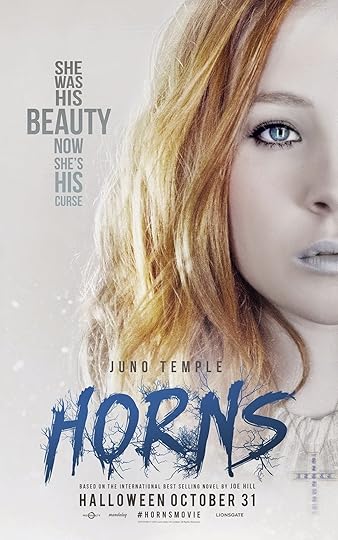 But Horns develops in a somewhat different way. To put it mildly. I shall now try to summarise the story. (Please don't send people after me with a strait-jacket. This actually is the plot of the movie.) As our hero wanders around, trying to piece together the fate of his girlfriend, and work out whether he killed her or not, he start to grow horns on his forehead. That's right, devil horns.
But Horns develops in a somewhat different way. To put it mildly. I shall now try to summarise the story. (Please don't send people after me with a strait-jacket. This actually is the plot of the movie.) As our hero wanders around, trying to piece together the fate of his girlfriend, and work out whether he killed her or not, he start to grow horns on his forehead. That's right, devil horns.And people react strangely to these horns — and not in the way you think. They begin to confess their deepest desires to our hero, and ask his permission to indulge them. If that sounds weird, well it is.
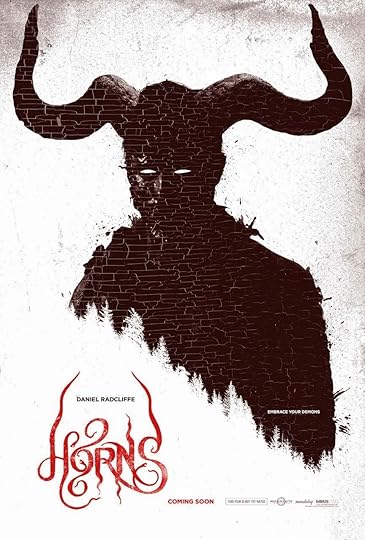 Horns, as well as being a murder mystery, love story, and tale of the supernatural, is also a comedy. And therein in lies the problem. These elements aren't successfully blended into a satisfying whole. Rather they're an unholy (no pun intended) mess. What is worse, the magical effects of Ig's horns keeps varying to suit the short term purposes of the script.
Horns, as well as being a murder mystery, love story, and tale of the supernatural, is also a comedy. And therein in lies the problem. These elements aren't successfully blended into a satisfying whole. Rather they're an unholy (no pun intended) mess. What is worse, the magical effects of Ig's horns keeps varying to suit the short term purposes of the script. Sometimes he has the power to get people to tell the truth, sometimes he brings out their hidden desires (not quite the same thing), sometimes he simply seems to exert the ability to control their behaviour.
Oh yes, and sometimes a bunch of supernatural snakes start slithering around. And Ig has the ability to unleash them on people he doesn't like. Except when he really needs to, in the big showdown at the end. Then he can't.
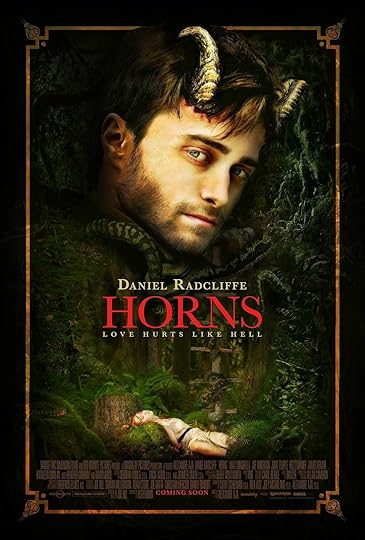 This is a fatal shortcoming. If you are going to tell a fantasy story you must be absolutely clear about the fantasy element and how it operates. You have to lay down ground rules (vampires can't be exposed to sunlight, werewolves are vulnerable to silver bullets...) and resolutely stick to them. Otherwise your whole narrative unravels. Which is what happens in Horns.
This is a fatal shortcoming. If you are going to tell a fantasy story you must be absolutely clear about the fantasy element and how it operates. You have to lay down ground rules (vampires can't be exposed to sunlight, werewolves are vulnerable to silver bullets...) and resolutely stick to them. Otherwise your whole narrative unravels. Which is what happens in Horns.What actually works best in the movie is the murder mystery aspect. The supernatural side of the story is a blithering mess. I sat there wondering how the hell (no pun intended) such an oddball movie could ever have got made. I mean, I couldn't imagine someone picking this up as an original script and saying , "Yes, we must green light this movie!" I decided it must be based on some source material...
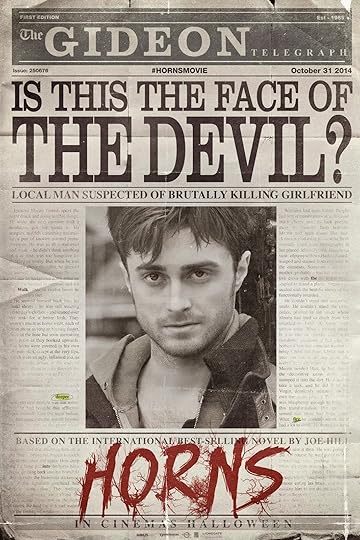 And sure enough, when the credits rolled at the end, it turned out to be an adaptation of a novel by Joe Hill. Now, Joe Hill is a very interesting writer. He's actually the son of Stephen King, but has very honourably refused to cash in on the name of his mega-famous dad and has carved out a career on his own terms, and his own merits.
And sure enough, when the credits rolled at the end, it turned out to be an adaptation of a novel by Joe Hill. Now, Joe Hill is a very interesting writer. He's actually the son of Stephen King, but has very honourably refused to cash in on the name of his mega-famous dad and has carved out a career on his own terms, and his own merits.Horns the movie was a dog's breakfast, but I suspect that Horns the novel might well work. All the disparate elements which failed to gel as a film could be much more harmoniously blended in prose. I shall check out Hill's book. In fact, I'm looking forward to it.
(Image credits: all the posters are from Ace Show Biz).
Published on November 16, 2014 02:52



